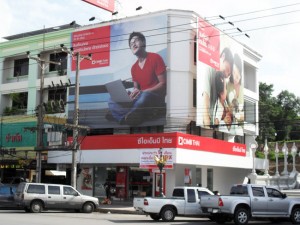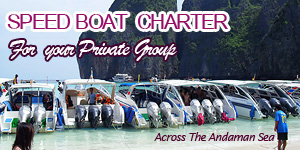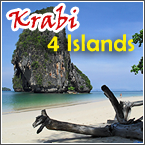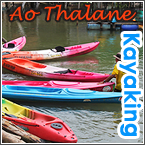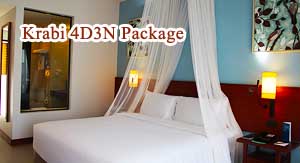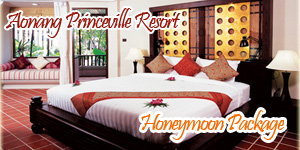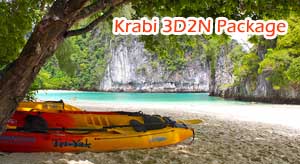Money Exchange, Credit & Debit Cards and ATMs
July 11, 2010 by admin
Filed under Related Interests
Exchanging Money and Restrictions
 There is no black market exchange rate, so you should only exchange money at a bank or similar foreign exchange facility, which give the best rates. (Of course, hotels give bad rates.) The international airport in Bangkok has currency exchange facilities. Traveller’s cheques are widely accepted in many major Bangkok establishments, though you should convert them into the local Thai baht at a bank or similar foreign exchange facility. There is not a large difference in value between traveller’s cheques and regular money, and you can get a slightly higher rate for traveller’s cheques. Large denominations of money (e.g., $100) get you a better exchange rate than small denominations (e.g., $20). Most of the major European and Asian currencies are accepted, though some are not. For example, it seems nobody will exchange Chinese Yuan/RMB or Indian rupees. If you’re not sure, then bring U.S. dollars. There’s no limit to the amount of money you can bring into Thailand. However, you can’t leave with more than 50,000 baht per person unless you have special authorization (this exact amount seems to change from time to time). You can carry out any amount of foreign currency, but there are restrictions at banks on how much Thai baht you can convert into foreign currency at one time, and for large amounts you will need to show your airplane ticket and passport, and maybe provide an explanation for very large amounts. (These restrictions are mainly the result of currency speculation surrounding the 1997 currency crisis, and again in 2007 due to “capital controls” which were discontinued in 2008.
There is no black market exchange rate, so you should only exchange money at a bank or similar foreign exchange facility, which give the best rates. (Of course, hotels give bad rates.) The international airport in Bangkok has currency exchange facilities. Traveller’s cheques are widely accepted in many major Bangkok establishments, though you should convert them into the local Thai baht at a bank or similar foreign exchange facility. There is not a large difference in value between traveller’s cheques and regular money, and you can get a slightly higher rate for traveller’s cheques. Large denominations of money (e.g., $100) get you a better exchange rate than small denominations (e.g., $20). Most of the major European and Asian currencies are accepted, though some are not. For example, it seems nobody will exchange Chinese Yuan/RMB or Indian rupees. If you’re not sure, then bring U.S. dollars. There’s no limit to the amount of money you can bring into Thailand. However, you can’t leave with more than 50,000 baht per person unless you have special authorization (this exact amount seems to change from time to time). You can carry out any amount of foreign currency, but there are restrictions at banks on how much Thai baht you can convert into foreign currency at one time, and for large amounts you will need to show your airplane ticket and passport, and maybe provide an explanation for very large amounts. (These restrictions are mainly the result of currency speculation surrounding the 1997 currency crisis, and again in 2007 due to “capital controls” which were discontinued in 2008.
Banks in Ao Nang
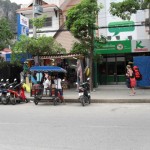
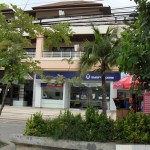
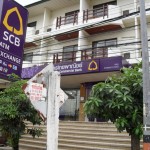
Credit Cards, Debit Cards and ATMs
It may be best to not bother to carry too much money into Thailand, or even carry on you while travelling around within Thailand, because you can get Thai baht from the ATM machines using your major credit card, even in many small towns around Thailand. The exchange rate is automatic and roughly as good as you’ll find. MasterCard and Visa are most commonly accepted, but other kinds of major credit cards are commonly accepted as well. Some carry a sizeable surcharge per withdrawal, e.g., $1, so check with your credit card company beforehand if this is bothersome to you. There are also Currency Exchange outlets, particularly in tourist areas. These are especially useful if you forget your PIN number or if you can’t find a working ATM’s near you which will accept your particular card for some reason. You will need your passport. You should always keep a good bit of cash on you at all times in Thailand. One reason is that the ATM machines often crash late at nite, and aren’t reset until the morning. Another reason is in case your credit cards are stolen or lost. While Thailand is a relatively safe country, theft can happen anywhere in the world. Not all ATM machines take all kinds of cards. Many will not take Visa or MasterCard, or will take one but not the other. You have to look for the credit card logos on the ATM signs. There are also the credit card groups such as Plus and Cirrus. If you look around, you will usually find a machine with your insignia on it. But I advise you to not get too low on cash. While most ATM machines offer both Thai and English, many offer only Thai. Those which process foreign credit cards like the above usually, but not always, offer dual language. You may be better off paying cash than using a credit card. While it’s technically against the law for the Thai vendor to pass onto you the fee that the credit card company charges them (approximately 2.25% to 3.5%, depending upon card type), it’s quite common for them to do so, and it’s usually not negotiable — you either pay the surcharge or don’t use your credit card. They often want to charge 4 or 5% instead of the 2.25% to 3.5%. You should also be aware that many vendors use a third party to bill your credit card. Thus, your credit card number may not be safe. Any time your credit card number goes down on paper, you could possibly be at risk.
Banks In Krabi Town.
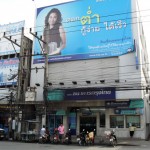
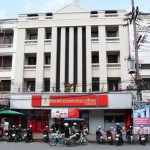
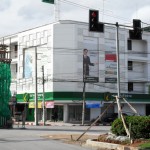
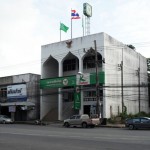
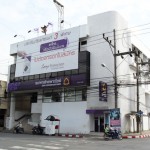
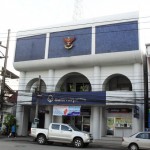
Banking
Setting up a bank account in Thailand is easy and quick, as long as you have your passport. You can bring in practically any amount of money, though getting it back out is another matter. Practically anyone living here should do this immediately. There are few legal restrictions as long as the money originates from abroad, though you will get a savings account, not a checking account. Cheques are seldom written here and are normally restricted to business transactions using company accounts. You can get a local ATM card immediately, as is standard practice, but not a chequebook. For large purchases, you can go to your bank to arrange a bank cheque to carry to the vendor. Your ATM card will work in any ATM machine regardless of bank. You will be given a bank book. You will not be mailed detailed bank statements from the bank as in many western countries. You should carry this bank book with you whenever you do a transaction with a teller. They will put the bank book into their machine, and your transactions will be printed on the pages of the bank book in order. If you do a lot of transactions (ATM, deposits) without bringing in your bank book for a long time, then one line may include a combination of many transactions in value with no itemization (one line with code ACM for ACcuMulated). You can use any branch of your bank for most transactions such as depositing local cheques, but you will find that a few services are available only at the branch in which you opened your bank account. The same goes for cashing (vs. depositing) a cheque — you must go to the branch number on the cheque of the issuing party, as is written clearly on the cheque, if you wish to cash the cheque. You can call the bank (phone numbers below) and find out where the branch is. For depositing a cheque, if the issuing party uses the same bank as yourself, then the money will usually be available for withdrawal immediately upon deposit. However, if the cheque is from a different Thai bank, then it will clear in two days, e.g., if you put it in Tuesday afternoon then it will be available for ATM withdrawal after 6:30pm on Thursday. If you deposit it before 10:00am, then the funds will usually be available the next day after 6:30pm. When you fill out a deposit or withdrawal form, be sure to use a duplicate form (carbon or chemical) so that you make two copies. They keep one and they stamp the copy to give to you as a receipt and with a computer printout on it having your name clearly typed. If your bank is poorly managed so you are stuck with no carbon, then just fill out two forms separately, as it won’t matter. Make sure to bring your passport if you want to withdraw cash at the counter rather than at an ATM.
Text Source : http://www.thailandguru.com/thailand-baht-money-transfer-banking-accounts.html#cards

